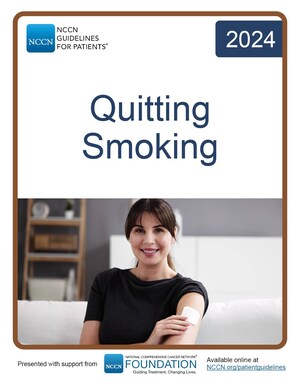New NCCN Guidelines for Histiocytosis Clarify Best Practices for Recently-Defined Cancers
New clinical practice guidelines from National Comprehensive Cancer Network focus on workup and management for three main adult histiocytic disorders.
PLYMOUTH MEETING, Pa., March 1, 2021 /PRNewswire/ -- The National Comprehensive Cancer Network® (NCCN®)—an alliance of leading cancer centers—today announced the publication of new NCCN Guidelines® for Histiocytosis. Histiocytoses are rare disorders characterized by a buildup of white blood cells called histiocytes, which leads to tissue damage. This group of disorders is diagnosed in a few thousand people every year across the United States. As a result of this low incidence rate, people are often diagnosed late and receive treatment from doctors who have limited or no prior experience with the disease. These new clinical practice guidelines from NCCN provide the latest evidence and expert-consensus for diagnosing and treating the three most-common forms of histiocytosis in adults: Langerhans cell histiocytosis (LCH), Erdheim-Chester disease (ECD), and Rosai-Dorfman disease.
"NCCN has assembled a panel of experts who have treated these rare cancers, enabling us to put together practice recommendations based on their collective experience supplementing the limited evidence available from published studies," said Ronald S. Go, MD, Mayo Clinic Cancer Center, Chair of the NCCN Guidelines Panel for Histiocytic Neoplasms. "For these 'orphan' cancers, the main challenges are late diagnosis, uncertainty on how to stage and monitor, and difficulty getting insurance to approve beneficial off-label treatments. Many histiocytosis patients have targetable mutations that are also present in some more common cancers with FDA approvals for targeted agents."
"Erdheim-Chester disease, a histiocytic neoplasm primarily seen in adults, was not officially recognized as a cancer by the World Health Organization until 2016. Historically, people with these disorders would receive empiric treatments from various specialists like rheumatologists and dermatologists; many wouldn't even see an oncologist until years later," said Gaurav Goyal, MD, O'Neal Comprehensive Cancer Center at UAB, a member of the NCCN Guidelines Panel for Histiocytic Neoplasms. "It's crucial that patients get the full diagnostic workup to guide treatment and reverse or ameliorate the course of the disease. We've been able to make tremendous gains in reducing mortality through genetic testing and treatment selection. The NCCN Guidelines will help us ensure every patient is able to benefit from the panel's collective expertise, including many with some of the broadest experience in treating people with these rare cancers."
One of the difficulties in treating different histiocytic disorders is the fact that they vary so much from one another and present in many different ways.
"Each of these diseases is biologically different with widely variable clinical presentation, diagnostic testing, and treatments employed," said Reem Karmali, MD, MS, Robert H. Lurie Comprehensive Cancer Center of Northwestern University, another NCCN Guidelines for Histiocytic Neoplasms panel member. "Symptoms vary as well – some patients are asymptomatic while others may develop chronic organ dysfunction or life-threatening symptoms that require immediate therapy. These NCCN Guidelines will raise awareness, educate the medical community at large, and provide a reference for commercial insurers to improve patient accessibility to diagnostic tools and potentially life-saving treatments."
The NCCN Guidelines for Histiocytosis are one of 80 different sets of recommendations that are updated and published by NCCN. They cover rare and common cancer types along with supportive care; detection, prevention, and risk reduction; and treatment for specific populations. There are also NCCN Guidelines for Patients® that provide the same expert content in easy-to-follow, jargon-free wording. All NCCN Guidelines are available free-of-charge for non-commercial use at NCCN.org or via the Virtual Library of NCCN Guidelines® App.
"The Histiocytosis Association appreciates the dedication of all those involved at the NCCN for developing and publishing guidelines for three of the histiocytic disorders," said Deanna Fournier, Executive Director, Histiocytosis Association. "As with all rare diseases, early diagnosis and awareness of the proper course of treatment has a very positive impact on patient outcomes; having access to the most up-to-date information at the ready will enable physicians around the world to continue to provide the best care to adults and children impacted by histiocytosis. We look forward to sharing the guidelines with our community."
"The ECD Global Alliance is very thankful for the hard work of the NCCN and the involved experts from the histiocytosis medical community for the publication of these guidelines," agreed Kathy Brewer, Global Alliance President, Erdheim-Chester Disease Global Alliance. "We are so hopeful that this will allow ECD and all histiocytosis patients to more easily gain access to the best care possible."
NCCN Guidelines are updated at least once a year. Future versions of the NCCN Guidelines for Histiocytosis include a planned expansion into pediatric treatment. This is part of NCCN's growing library of recommendations for improving care standards for children with cancer. Recently, NCCN published guidelines for managing Wilms tumor, a kidney cancer that primarily impacts children under age eight. For updates, register for a free account at NCCN.org.
About the National Comprehensive Cancer Network
The National Comprehensive Cancer Network® (NCCN®) is a not-for-profit alliance of leading cancer centers devoted to patient care, research, and education. NCCN is dedicated to improving and facilitating quality, effective, efficient, and accessible cancer care so patients can live better lives. The NCCN Clinical Practice Guidelines in Oncology (NCCN Guidelines®) provide transparent, evidence-based, expert consensus recommendations for cancer treatment, prevention, and supportive services; they are the recognized standard for clinical direction and policy in cancer management and the most thorough and frequently-updated clinical practice guidelines available in any area of medicine. The NCCN Guidelines for Patients® provide expert cancer treatment information to inform and empower patients and caregivers, through support from the NCCN Foundation®. NCCN also advances continuing education, global initiatives, policy, and research collaboration and publication in oncology. Visit NCCN.org for more information and follow NCCN on Facebook @NCCNorg, Instagram @NCCNorg, and Twitter @NCCN.
Media Contact:
Rachel Darwin
267-622-6624
[email protected]
Photo - https://mma.prnewswire.com/media/1444214/Histiocytic_Neoplasms.jpg
Logo - https://mma.prnewswire.com/media/441768/NCCN_Logo.jpg





Share this article